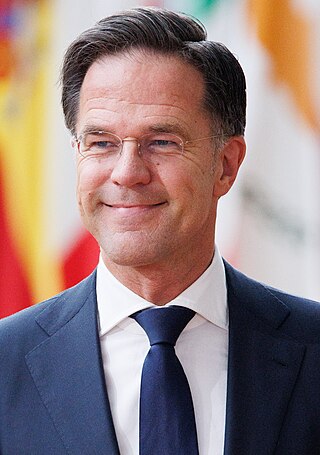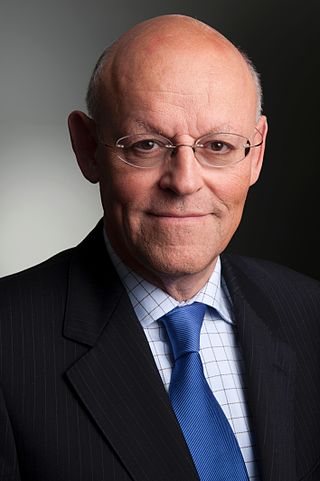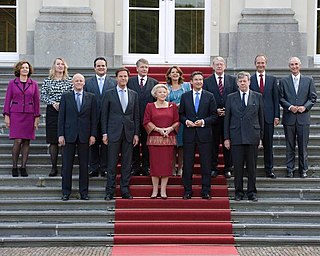| |||||
| Decades: | |||||
|---|---|---|---|---|---|
| See also: | |||||
This article lists some of the events that took place in the Netherlands in 2012.
| |||||
| Decades: | |||||
|---|---|---|---|---|---|
| See also: | |||||
This article lists some of the events that took place in the Netherlands in 2012.

The People's Party for Freedom and Democracy is a conservative-liberal political party in the Netherlands. The VVD, whose forerunner was the Freedom Party, is a party of the centre-right that tries to promote private enterprise and economic liberalism.

The Netherlands is a parliamentary representative democracy. A constitutional monarchy, the country is organised as a decentralised unitary state. The Netherlands can be described as a consociational state. Dutch politics and governance are characterised by a common striving for broad consensus on important issues, within both of the political community and society as a whole.
Liberalism in the Netherlands started as an anti-monarchical effort spearheaded by the Dutch statesman Thorbecke, who almost single-handedly wrote the 1848 Constitution of the Netherlands that turned the country into a constitutional monarchy.

General elections were held in the Netherlands on 22 November 2006, following the fall of the Second Balkenende cabinet. The election proved relatively successful for the governing Christian Democratic Appeal (CDA) which remained the largest party with 41 seats, a loss of only three seats. The largest increase in seats was for the Socialist Party (SP), which went from nine to 25 seats. The main opposition party, the social democratic Labour Party (PvdA) lost nine of its 42 seats, while the right-liberal People's Party for Freedom and Democracy (VVD) and the progressive liberal Democrats 66 lost a considerable portion of their seats, six of 28 and three of six, respectively. New parties, such as the right-wing Party for Freedom (PVV) of former VVD MP Geert Wilders and the animal rights party Party for the Animals (PvdD) were also successful, with the PVV winning nine seats and the PvdD winning two, thereby becoming the first animal rights group to enter a European parliament.

The first Kok cabinet, also called the first Purple cabinet was the executive branch of the Dutch government from 22 August 1994 until 3 August 1998. The cabinet was formed by the social-democratic Labour Party (PvdA), the conservative-liberal People's Party for Freedom and Democracy (VVD), and the social-liberal Democrats 66 after the election of 1994. The cabinet was a centrist grand coalition and had a substantial majority in the House of Representatives with Labour Leader Wim Kok serving as Prime Minister. Prominent Liberal politician Hans Dijkstal served as Deputy Prime Minister and Minister of the Interior, while Progressive-Liberal Leader Hans van Mierlo served as Deputy Prime Minister and Minister of Foreign Affairs.

Mark Rutte is a Dutch politician who has served as Secretary-General of NATO since October 2024. He previously served as the prime minister of the Netherlands from 2010 to 2024, and as the leader of the People's Party for Freedom and Democracy (VVD) from 2006 to 2023. Serving a total of 13 years, 262 days, Rutte was the longest-serving prime minister in Dutch history.

General elections were held in the Netherlands on Wednesday 9 June 2010. This was triggered by the fall of Prime Minister Jan Peter Balkenende's fourth cabinet on 20 February with Queen Beatrix accepting the resignation of the Labour Party (PvdA) ministers on 23 February. The conservative-liberal People's Party for Freedom and Democracy (VVD), led by Mark Rutte, won the largest number of seats in the House of Representatives while the social-democratic PvdA, led by Job Cohen, came a narrow second. The election was also noted for the rise of the Party for Freedom (PVV), which came third, led by controversial politician Geert Wilders. On the other hand, Balkenende's Christian Democratic Appeal (CDA) saw a poor result, losing half its seats and dropping from first to fourth place. The Socialist Party (SP) also lost seats. Notably, the 31 seats won by the VVD was its most since 1998, and the one-seat margin between the VVD and PvdA is the closest on record.

Uriël "Uri" Rosenthal is a retired Dutch politician of the People's Party for Freedom and Democracy (VVD) and political scientist.

After the general election of 9 June 2010, a cabinet formation took place in Netherlands. This led to the swearing in of the First Rutte cabinet after 127 days. The cabinet consisted of the conservative liberal People's Party for Freedom and Democracy (VVD) and the Christian Democratic Appeal (CDA), with confidence and supply from the radical right Party for Freedom (PVV).

The first Rutte cabinet, also called the Rutte–Verhagen cabinet was the executive branch of the government of the Netherlands from 14 October 2010 until 5 November 2012. The cabinet was formed by the conservative-liberal People's Party for Freedom and Democracy (VVD) and the Christian-democratic Christian Democratic Appeal (CDA) after the election of 2010. The cabinet was a right-wing coalition and had a minority in the House of Representatives but had confidence and supply from the Party for Freedom (PVV) for a slim majority with Liberal Leader Mark Rutte serving as Prime Minister. Christian Democratic Leader Maxime Verhagen served as Deputy Prime Minister and Minister of Economic Affairs, Agriculture and Innovation.
The Party for Freedom is a nationalist and right-wing populist political party in the Netherlands. Geert Wilders is the founder, party leader, and sole member of the party.

Early general elections were held in the Netherlands on 12 September 2012 after Prime Minister Mark Rutte handed in his government's resignation to Queen Beatrix on 23 April. The 150 seats of the House of Representatives were contested using party-list proportional representation. The People's Party for Freedom and Democracy (VVD) received a plurality of the votes, followed by the Labour Party (PvdA).

General elections were held in the Netherlands on Wednesday 15 March 2017 to elect all 150 members of the House of Representatives.
This article lists some of the events from 2016 related to the Netherlands.

General elections were held in the Netherlands from 15 to 17 March 2021 to elect all 150 members of the House of Representatives. Following the elections and lengthy coalition formation talks, the sitting government remained in power.
This article lists major events that happened in 2017 in the Netherlands.

The third Rutte cabinet was the cabinet of the Netherlands from 26 October 2017 until 10 January 2022. It was formed by a coalition government of the political parties People's Party for Freedom and Democracy (VVD), Christian Democratic Appeal (CDA), Democrats 66 (D66) and Christian Union (CU) after the general election of 2017.

Sophia Theodora Monique "Sophie" Hermans is a Dutch politician currently serving as Second Deputy Prime Minister of the Netherlands and Minister of Climate and Green Growth in the Schoof cabinet. Hermans previously served as a member of the House of Representatives representing People's Party for Freedom and Democracy between 2017 and 2024.

Early general elections were held in the Netherlands on 22 November 2023 to elect the members of the House of Representatives. The elections had been expected to be held in 2025 but a snap election was called after the fourth Rutte cabinet collapsed on 7 July 2023 due to immigration policy disagreements between the coalition parties. The incumbent Prime Minister Mark Rutte announced that he would not lead his party into the election and that he would retire from politics.

A process of cabinet formation took place in the Netherlands following the general election of September 2012. After 54 days this led to the Second Rutte cabinet, consisting of People's Party for Freedom and Democracy (VVD) and Labour Party (PvdA). This made it one of the fastest cabinet formations. The formation was the first in which the monarch of the Netherlands did not play an active role.